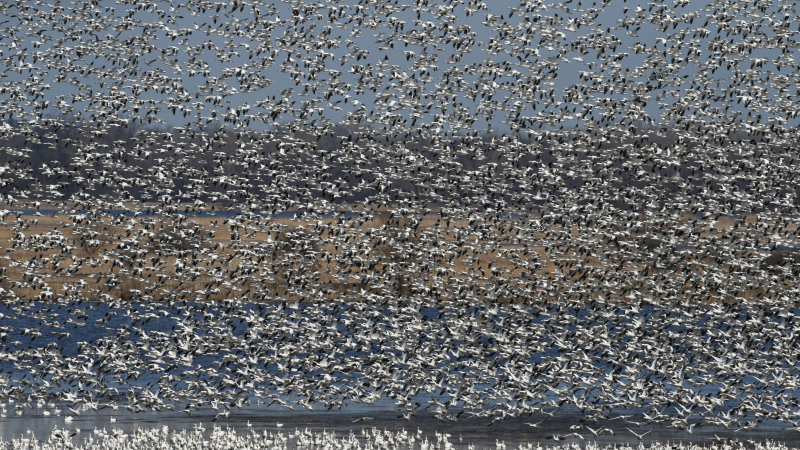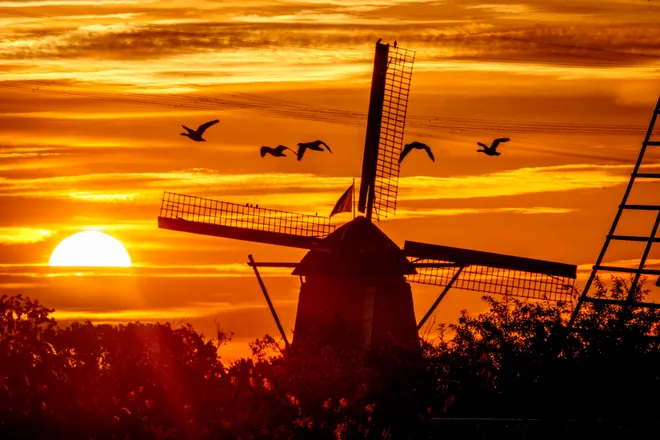Fireworks on New Year's Eve send birds into a 'panicked state,' scientists discover
Scientists have discovered that New Year's Eve is by far the worst night of the year — for birds.
The large amount of fireworks set off in unison at the stroke of midnight create an enormous disturbance for birds and cause many species to take flight for an unusually long length of time, sensing they may need to avoid nearby danger.
Even though birds fly a lot in general, they end up wasting a lot of energy New Year's Eve flying unexpectedly for long periods of time, which can be especially physically taxing, said Bart Hoekstra, the lead author of the study.
"They're not keeping a calendar and saying, 'Oh yeah, it's five days until it's New Year's Eve again. At midnight, this is going to happen,'" Hoekstra, said. "If they could, they probably would and it wouldn't scare them so much — but they can't."
Some birds may be in the air for up to an hour after fireworks erupt on New Year's Eve, causing them to expend extraordinary amounts of energy during one of the coldest times of the year, researchers found. In some cases, birds spent the next 11 days recovering from using up all that energy, Hoesktra said. The findings from the University of Amsterdam are among the latest scientific evidence of the negative effects human activities have on animals, experts told USA TODAY.
Using radar technology, the researchers in the Netherlands discovered that in the moments after fireworks are set off on New Year's Eve, there were approximately 1,000 times more birds in flight than on other nights.
Birds near you: What bird watchers see in your state in December

Birds take flight for unusually long time, researchers found
Unusual, unexpected amounts of noise and light from fireworks alert birds that danger might be near, causing them to take flight, researchers say in their report. But the length of time the animals stay aloft is what's most troubling, said Wesley Hochachka, an ornithologist at Cornell University who studies bird behavior.
"The thing that surprised me was how long birds were in the air," Hochachka told USA TODAY.
In the Dutch study, researchers found birds were in the air for as long as an hour, a flight time nearly every bird species only embarks on "if they're on migration," Hochachka said. Some birds tracked in the Netherlands flew as far as six miles after being startled by fireworks, according to Hoekstra.
"We know that birds really need to recover that energy that they lose by flying for that long in such a panicked state, so this has a very, very strong energetic impact on these birds," Hoesktra said.
Since winter is not a time when birds migrate, fireworks at New Year's Eve come "at a time of year when birds aren't physically prepared to fly for those prolonged periods of time," Hochachka said.

Long flights take birds to unfamiliar areas
The long flights many bird species take on New Year's Eve likely take them to unfamiliar areas where they've never foraged before, researchers found.
In the study, geese were frequently pushed further away from their home base, into new foraging and roosting sites, "exacerbating" the loss of energy caused by the fireworks, because it takes animals longer to find food in unfamiliar areas, the report authors said.
Researchers found geese disturbed by fireworks foraged for food for 10% longer for more than a week after New Year's Eve. The study focused mostly on larger birds who have to flee by flying away, unlike the smallest bird species that can hide from perceived danger by burrowing into bushes or leaves on the ground, Hoekstra said.
Although the radar study was conducted in the Netherlands, geese in North America could be similarly affected by New Year's Eve fireworks, especially in areas where urban communities border flat areas where geese roost, Hochachka said.
Mapping technology Hochachka created at Cornell's Lab of Ornithology shows the heaviest winter concentration of geese in the U.S. is in the southern Midwest: Arkansas, Missouri and Illinois. Parts of Mississippi and Louisiana are also home to many of the birds during winter, as well as a strip of the mid-Atlantic coast and California's Central Valley. Those areas of the U.S. are where the results of the Netherlands study are the most applicable, according to Hochachka.
Human activity can cause chronic stress in birds
In all corners of the world, animals are good at adapting to human behavior, as long as it's consistent and predictable, said Hoekstra. Some animals become more nocturnal to adjust to human sleep schedules, and others come to rely on our garbage that get's thrown out every day, he said.
But enormous, prolonged fireworks displays are precisely the kind of rare event that no species can learn to adapt to, he said.
Authors of the report recommend policymakers push to limit the use of fireworks to centralized areas, so that their negative effects on birds are less widespread.
The New Year's Eve fireworks example is likely the most extreme example of human activity disturbing birds on any given year, causing noticeable physical, physiological and nutritional stress for the animals, Hochachka said.
But that doesn't mean birds aren't stressed out by more low-level disturbances at all other times of the year, he said.
The "single sharp disturbance" caused on New Year's Eve "potentially tells us about something about chronic disturbances of birds in areas around a lot of human activity," he said.
Most-sighed backyard birds during December
Disclaimer: The copyright of this article belongs to the original author. Reposting this article is solely for the purpose of information dissemination and does not constitute any investment advice. If there is any infringement, please contact us immediately. We will make corrections or deletions as necessary. Thank you.






